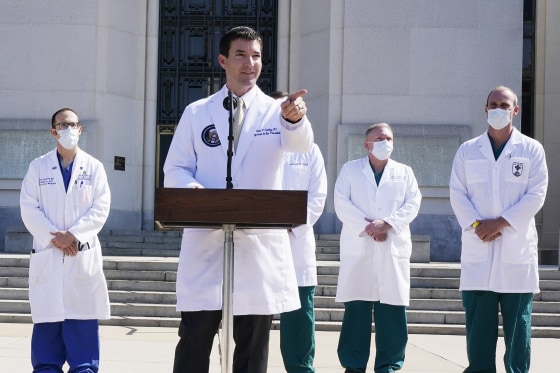Soon after President Donald Trump tested positive for the coronavirus, he received a special experimental treatment of monoclonal antibodies from drug manufacturer Regeneron that almost no one else in the world has access to outside ongoing clinical trials. Since these therapeutic agents aren't yet available to the public, the president was able to receive them through a "compassionate use" protocol, which makes experimental treatments available on a limited basis to those in desperate need with no other alternatives available.
The health and well-being of the U.S. president affects the U.S. population as a whole in several ways that go beyond the impact of a regular person on the greater world.
We'll have to wait a while to know whether they worked for Trump's infection, but we do know from watching him carelessly remove his mask Monday night, after returning from Walter Reed hospital and dismissing the risk of the coronavirus, that he comes back to the White House with less compassion — and more contempt — than ever.
Regardless of the president's attitude, the medical establishment wasn't wrong to give Trump special access to this new treatment. Hundreds of thousands of people with Covid-19 may want treatment with these monoclonal antibodies, but there are reasons a U.S. president should get preference over them because of the office he holds.
The principle of providing access to drugs under compassionate use is meant for people with immediately life-threatening or serious illnesses for which no approved treatments are available and for which they can't participate in a clinical trial. It has this designation because when pharmaceutical companies make their investigational treatments available this way, they are doing so more as an act of compassion than as a means to achieve their standard scientific and commercial objectives.
Getting access to experimental treatments under compassionate use isn't a matter of just asking for them, however. Formal mechanisms to get unapproved drugs under investigation have been in place since 1987 and informally before then. To satisfy regulatory requirements motivated by patient safety considerations, a licensed physician must apply to the pharmaceutical company for the patient. The pharmaceutical company then evaluates the case to determine whether there's reason to think the requested drug could be safe and effective.
The pharmaceutical company must also get approval from the Food and Drug Administration. And the final step is for the compassionate use treatment plan to be reviewed and approved by an independent group that evaluates research protocols at the site where the patient will receive the treatment.
These requirements provide a measure of safety for people treated with pre-approved drugs through compassionate use. News reports suggest that the president's case was subject to this review process, at least as it concerns the involvement of the pharmaceutical company and the FDA.
While anyone can apply for investigational treatments through compassionate use protocols, supplies can be very limited, because pharmaceutical manufacturers need to provide most of the drug they produce for their clinical trials, which is a requirement for any medication to reach mass production.
This means that some applicants — most in some cases — won't receive the drugs they had hoped to get under compassionate use requests. And even when there are adequate supplies, access to them is dependent on physicians' knowing about the compassionate use protocols, having the time to submit applications and possessing the capabilities to administer the treatments. In other words, it's a selective group that gets access to these advanced medications,.
Fair processes are therefore needed to reduce, as much as possible, inequities that could work against various groups of people. Unless there are clinical reasons to, no one should be excluded from consideration on the basis of age, sex, race, ethnicity, socioeconomic status, location, occupation, financial wherewithal and the like.
But still, hard choices need to be made when there's not enough to go around, and that's where judgments can come into play. For example, a scenario I've encountered many times is one in which there's enough supply of a drug for only one person at a given moment when two people are asking for it. One person is 80 years old, and the other person is 45. All else being equal, the younger person would be favored.
Sometimes, though, these general guidelines can be too crude or limited for determining whether a specific person should get the only dose of a treatment. For instance, what if the patient is the U.S. president?
Having served on panels assembled to consider the ethical dimensions of particular cases of compassionate use, I can appreciate how the importance of the office of U.S. president could be enough to allocate supply to the occupant as the result of a fair process.
The argument in favor of preference for this occupation, when generally there should be no distinction between members of different professions, is that the health and well-being of the U.S. president affect the U.S. population as a whole in several ways that go beyond a regular person's impact on the greater world.
If the president becomes disabled or dies, there could be severe consequences related to national security, domestic unrest, financial market upheavals and other types of events that could affect huge numbers of people. And ethics also dictate that this evaluation shouldn't hinge on personality or politics.
Trump's treatment with experimental drugs has raised questions about the availability of compassionate use options for many ordinary people who might not have known about them until now. These questions and greater awareness are important — as is an understanding that the decision to give Trump the investigational monoclonal antibodies was justified.
At the same time, the president has demonstrated that receiving cutting-edge treatments through compassionate use protocols can't be expected to engender compassionate behavior where there was none before. In this particular case, Covid-19 is more contagious than compassion.



